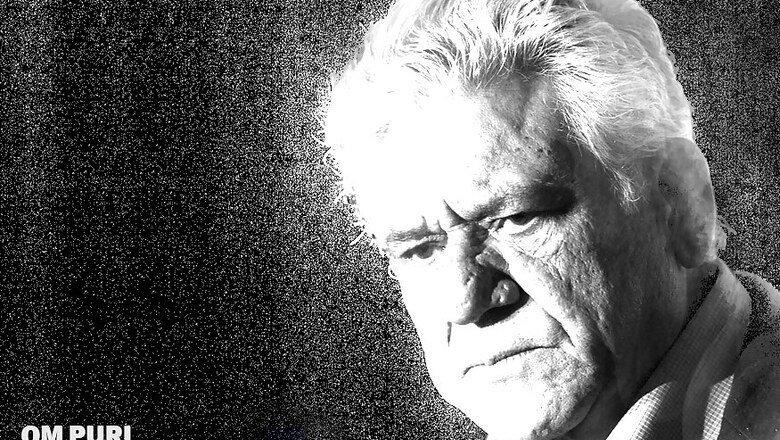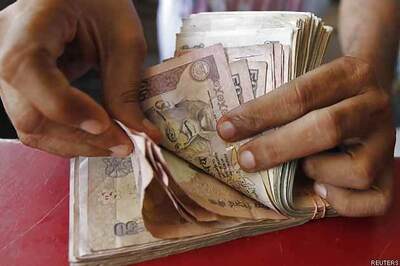
views
In Saul Bellow’s brilliant one-day high-and-low, sulk-and-stew novel Seize the Day, Tommy Wilhelm, the hero who is on the brink of chaos, is a failed actor. His scout, before Wilhelm goes for his screen test, tells him: “Don’t be afraid to make faces and be emotional. Shoot the works. Because…you’re no more an ordinary person…. You don’t behave the same way as average.’’
Om Puri not only behaved the same as average in Hindi cinema, but made it the high point of his appeal. In Gandhi, in a small role, he, eyes burning with rage, accosts the Mahatma; in Aakrosh, he, deeply singed by the corrupt, tells his horrifying story through silence; in Ardh Satya, he, anger packed into every sinew of his body, excoriates the system; in Sadgati, he, chained frustratingly to life-wrecking rigours of pernicious casteism and poverty, is powerless and, at the end, lies so lifeless that even the just-launched money empowering app Bhim would not be able to inject any life into him.
In Ray’s short and powerful film, as Mohan Agashe, the brahmin, drags the body of Om, who plays a chamaar, through mud, thunderheads roll ominously in the background. Through the final sequence, Om plays the dead chamaar to such perfection that he leaves, as his body is dragged on a string through the red, roiling mud, an indelible mark on the imagination of the Indian cinema aesthete. The rain in the film leaves the earth soggy and runny, erasing the tracks the dragging of his lifeless body makes on bubbling mud, but in the minds of any serious cinema student the name of Om will always keep bubbling up with devout regularity.
Humbleness defined Om. And generosity. His beginnings were small. He struggled through his teenage years and even later. Although he was preternaturally talented as a theatre artiste, he was always short of money. His love of theatre brought him from the boondocks of rustic Punjab to the proscenium of glitzy Delhi. And on the way his natural flair for acting was honed by Ebrahim Alkazi, the doyen of Indian theatre. But Om never fell out of love with his roots. When his acting prowess had crossed national and international boundaries, he helped to set up a theatre in the memory of his guru, Harpal Tiwana, in Patiala.
After Shashi Kapoor, Om became India’s crossover champion. In Britain he did films regularly and, when the chance arose, crossed the pond to work in Hollywood too. He plays a perfect Zia in Charlie Wilson’s War; again, in The Reluctant Fundamentalist, he essays the role of a Lahori father with ease. Pakistan always treated Om well, the actor and his art easily crossing fraught boundaries.
At 62, Om was back on stage again. This journey, like the voyage from theatre to films, too came about after his friend Naseeruddin Shah prompted him to get back to theatre. With Divya Dutta, he had mounted a play in Delhi. And audiences loved him as a thespian, his baritone booming to all the corners of the auditorium and into their stirred hearts.
Majma, his theatre company, provided him his livelihood during the initial phase of his struggles in Bombay and it was to Majma he went when Bollywood, with its mind-numbing song-and-dance routine, began to bore him. The first stint was for basic survival, the second for spiritual salvation. But Om rued deeply that there were no playwrights of note in Hindi, a language he loved like nothing else. After Mohan Rakesh, he said, there was no one. He said Hindi theatre was sclerotic, but always applauded the vibrancy of Bengali and Marathi theatre
Om, because of his initial struggles, always stood by the underdog and this conviction made him utter some intemperate comments about politics and people involved with it. Not that his politics were wrong, but the tight emotional control he so readily displayed in many films left him suddenly when it came to the rough and tumble of politics. For the actor, reality had its own dialogue delivery, a crude argot he could never understand. But Om persisted and was rampantly mocked. At times he became a punching bag, jabs made of 140 characters knocking him around with immense ferocity.
Tommy Wilhelm, the smart but going-to-seed Bellowian hero, fails to make the grade in Hollywood even after his scout says he will place him as the type that loses the girl to some other guy. In Bollywood, with its weird boy-and-girl dramas, Wilhelm would not even get past the studio gates. It was to Om’s credit and to his remarkable, audience-enthralling, geography-jumping talent that he not only went past the studio gates, but sallied forth into the hallowed chambers of thespian kingdom and found a permanent place there. After his passing there he will stay, enshrined in memories forever.
















Comments
0 comment